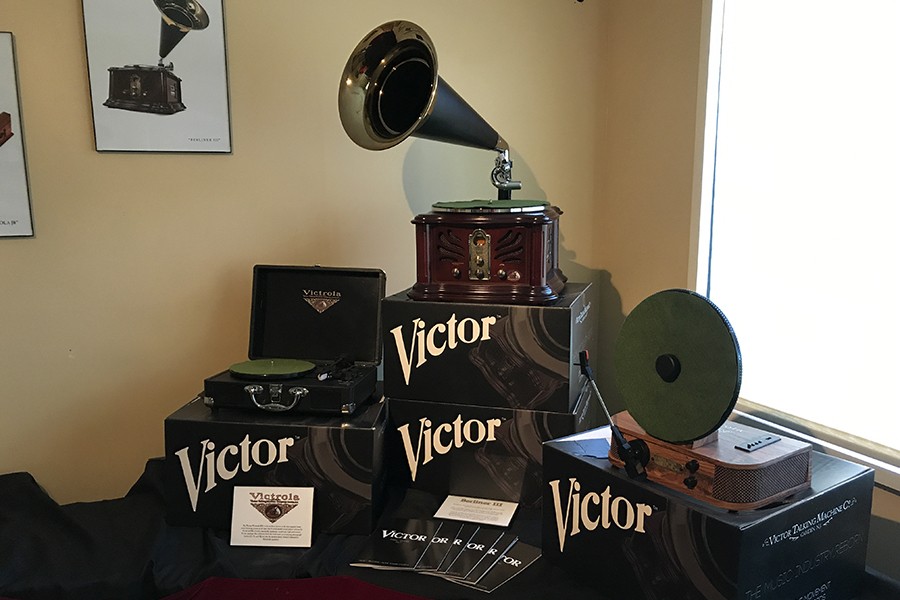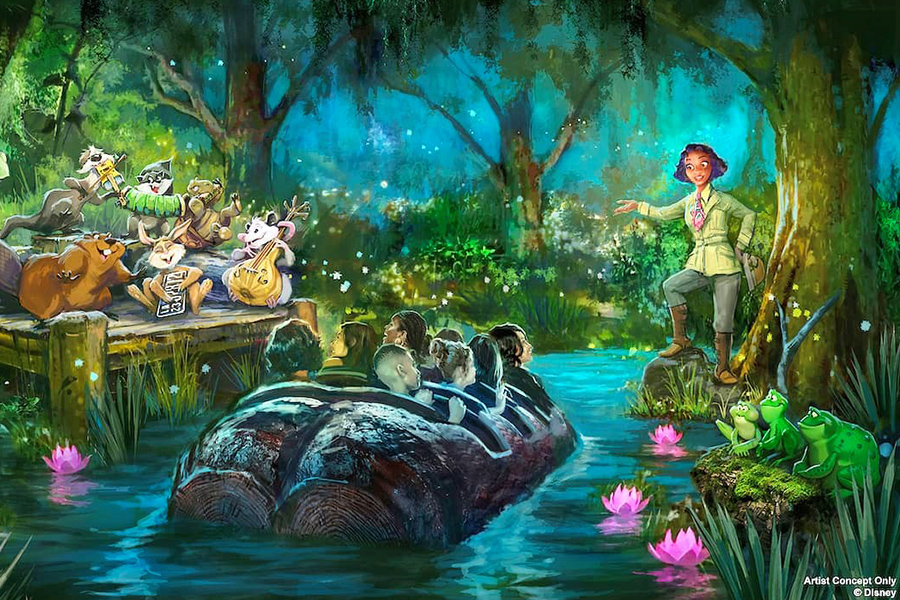Finding (and making) musical treasures at the Vault

From the outside, the neutral-colored building that was once a bank branch is a nondescript structure on a nondescript stretch of the White Horse Pike in Berlin. But, as if to illustrate the old “book/cover” saying, it is actually as extraordinary on the inside as it is ordinary on the outside.
The generic, forgettable exterior obscures the building’s status as, arguably, South Jersey’s (if not the entire Philly region’s) finest small-scale, live-music venue, as well as a repository for a crucial chunk of American pop culture.
The complex is called The Vault, a nod to its past life. Its main space can accommodate up to 120 people and boasts superb acoustics and sight lines. Its intimacy is second-to-none among regional listening rooms of similar size. Since its 2015 opening, The Vault has hosted scores of live performances representing multiple musical forms (although the emphasis tends to be on rock and its sub-genres). Among the acts who have performed there are Leigh Nash, lead singer of the band Sixpence None the Richer; longtime Billy Joel drummer Liberty DeVito, who has appeared with his band The Slim Kings; Grammy-nominated singer Kim Richey, and Sarah Lee Guthrie, daughter of Arlo and granddaughter of Woody.
But it is The Vault’s status as a museum of recorded sound that makes it truly special. It houses a treasure trove of some 10,000 recordings, many of which date back to the earliest days of publicly distributed recorded music. Included in the collection are works by operatic titan Enrique Caruso and jazz giants Duke Ellington and Louis Armstrong. Among the individual items are a 1918 version of Rimsky-Korsakov’s “Scheherazade” by the Philadelphia Orchestra under the direction of legendary conductor, Leopold Stokowski, and a 1939 unreleased version of the song, “When I Awake” by Tommy Dorsey and His Orchestra with vocals by a young singer named Frank Sinatra.
There is also a song by an ensemble called the Haydn Quartet from 1904 which, quite possibly, contains the first known use of the phrase “rock ’n’ roll.”
The Vault is the brainchild/headquarters of Camden native Graham Alexander, a singer-composer whose resume includes two stints on Broadway performing as Paul McCartney in the Beatles tribute productions, “Rain” and “Let It Be” (for which the righthanded musician learned to play left-handed bass in the manner of McCartney). It is he who owns not only The Vault, but the rights to the Victor Talking Machine Co. name, as well as those of Victrola, Camden and His Master’s Voice, He even owns the likeness of Little Nipper (just the dog, not the famed corporate logo that also features an antique record player with a large sound bell).
Alexander’s parent company is called Radio Corporation of America, which was the original name of the still-active imprint, RCA.
Alexander’s fascination with the pioneering Camden-based company began in his youth, when he would walk -- or ride the Hi-Speed Line -- with his mother past the abandoned buildings that comprised the once-flourishing RCA Victor complex along the city’s waterfront. Each time the hulking brick structures came into view, he’d ask about them, but, he said, he never received a satisfactory answer beyond basic history: The buildings were where, for the first three decades of the 20th century, Victor, the world’s first recorded-music giant, had its headquarters, and where RCA Victor did business until the early 1960s.
Two decades later, Alexander, 28, who currently lives in Haddonfield, not only knows the story of RCA Victor and its forebear, the Victor Talking Machine Co., but he has taken it upon himself to revive the brand that for decades, was literally a household name.
Alexander’s game plan was first conjured in 2011, when he found himself vexed by the music industry’s reluctance to commit to artists who didn’t conform to contemporary popular tastes. At the time, he was appearing on Broadway in “Rain.” In December of that year, he independently released his first, self-titled CD, which enjoyed a good deal of popularity on Spotify, the Internet music-streaming service. Ultimately, his song, “Biggest Fan,” made it to sixth place on the site’s “top 100” list.
Buoyed by the response to the track, he headed to Los Angeles hoping to land a contract with a major record label.
“They kind of said, ‘Well, this is wonderful. We really love the product, but what if it sounded more like Maroon 5?’” he recalled. “I thought to myself, ‘No money got it to number six on the Spotify playlist, how is it that you don’t have the confidence to sign me?’”
More frustrated than defeated, he returned home realizing his best bet was to develop on his own an infrastructure to support his musical career. The easy way would have been to simply create a new record label with a name he devised. But his childhood memories came into play.
“I had heard about these things called ‘brand auctions,’ he explained, adding that, through a series of sales and corporate takeovers, the names he wound up with were no longer of any value to the company -- Sony Music -- that owned them.
“The first one we went after was ‘Victrola,’” he said. “I knew it was the name of a record player, but more importantly, I knew they were [manufactured] in Camden.
“When I saw it was something I could possibly acquire as intellectual property, I thought, ‘Wow, that’s really, really cool.’ And we could start a label based on this brand, and revive it and bring it back to the area.
“I just thought, wouldn’t it be a really cool thing to get ‘His Master’s Voice?’ I knew it was a label, and I knew that was a part of that property. Then I went after Victor Talking Machine Co. and then I went after Little Nipper.”
The goal, he continued, “is to establish what we’ve been calling a ‘luxury music market.’ Almost every industry has formed a luxury market of some kind. The supermarket industry has Whole Foods. Ice cream has Ben & Jerry’s. The idea is that record labels will be important, especially if they are seen like an artisan label. We would really like to support musicians who are organic and authentic -- no Auto-Tune, real orchestras. People who compose and perform their own music.”
Another part of that plan includes the manufacture and distribution of record turntables.
Alexander’s acquisitions didn’t come cheaply. When asked, he declined to offer a dollar amount, but admitted that to finance the plan, he had to sell the 10,000-square-foot, former manufacturing plant in Pennsauken where he lived, and which housed a recording studio.
As for the museum side of things (which also includes a collection of century-plus-old music-playing devices), Alexander, the son of Fran Smith Jr., bassist for The Hooters, hopes to use it to educate South Jersey residents -- especially children -- about the region’s crucial place in musical history.
If there is a downside to Alexander’s mission, it’s that he is now as much a businessman as he is a musician.
“I hate it. I really hate it,” he insisted. “I definitely regret not having enough time to (make music). But at the same time, you’re in music.
“I think the bottom line is I have so many friends who are great musicians, who will (likely otherwise) never see the light of day in terms of their music. But if you promise a certain quality, people will be interested. The idea of being able to assist with that -- and also help myself -- to me, that’s pretty cool.”
For more information, go to www.victorrecords.com.






